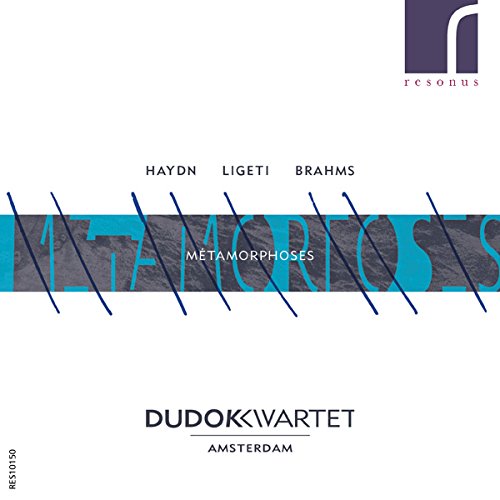HAYDN; LIGETI; BRAHMS String Quartets
View record and artist detailsRecord and Artist Details
Composer or Director: Joseph Haydn, Johannes Brahms, György Ligeti
Genre:
Chamber
Label: Resonus Classics
Magazine Review Date: 11/2015
Media Format: CD or Download
Media Runtime: 57
Mastering:
DDD
Catalogue Number: RES10150

Tracks:
| Composition | Artist Credit |
|---|---|
| (3) String Quartets, 'Tost I', Movement: No. 2 in C |
Joseph Haydn, Composer
Dudok Quartet Joseph Haydn, Composer |
| String Quartet No. 1, 'Métamorphoses nocturnes' |
György Ligeti, Composer
Dudok Quartet György Ligeti, Composer |
| (7) Pieces, Movement: No. 2, Intermezzo in A minor |
Johannes Brahms, Composer
Dudok Quartet Johannes Brahms, Composer |
| (7) Pieces, Movement: No. 4, Intermezzo in E |
Johannes Brahms, Composer
Dudok Quartet Johannes Brahms, Composer |
| (4) Pieces, Movement: No. 1, Intermezzo in B minor |
Johannes Brahms, Composer
Dudok Quartet Johannes Brahms, Composer |
| (6) Pieces, Movement: No. 3, Ballade in G minor |
Johannes Brahms, Composer
Dudok Quartet Johannes Brahms, Composer |
Author: Peter Quantrill
From its false-bottomed opening, Haydn’s Op 54 No 2 is even more prodigally original, and perhaps even Hans Keller would be satisfied with the ‘invention without concession’ displayed by the members of this young Dutch quartet, and especially its leader Judith van Driel. The slow movement is a tour de force of controlled improvisation, grave and focused yet fulfilling Keller’s demand that it serve as a prelude to the Minuet, which is sufficiently measured that the keening drama of the Trio does not entirely come out of the blue. The pure tone chosen for the slow finale’s unison opening enhances its unsettling impact, and only after the furious presto interruption do they allow vibrato to spread pathos through the coda.
The Brahms arrangements are well done by the leader and cellist, though they still subtract more than they add to the originals. The decay afforded by a well-struck key and the sustain pedal is not within a string player’s vocabulary and yet the dying fall of each piece here demands it. Even so, the portamento and rubato here are as lightly worn as is their absence elsewhere. Not since the Elias Quartet’s Mendelssohn (ASV, now Alto, 5/07) has the debut disc of a quartet kept inviting me back to think more and listen harder.
Explore the world’s largest classical music catalogue on Apple Music Classical.
Included with an Apple Music subscription. Download now.

Gramophone Digital Club
- Digital Edition
- Digital Archive
- Reviews Database
- Events & Offers
From £9.20 / month
Subscribe
Gramophone Club
- Print Edition
- Digital Edition
- Digital Archive
- Reviews Database
- Events & Offers
From £11.45 / month
Subscribe
If you are a library, university or other organisation that would be interested in an institutional subscription to Gramophone please click here for further information.






